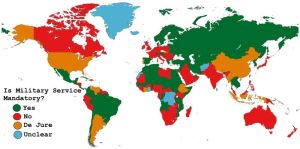Military Service
Human Trafficking, Legalized. Signed and dated hundreds of years ago.
Compulsory military service, a common practice in Southeast Asia and many other regions, sparks debate around human rights and its impact on young people's lives. While proponents see it as crucial for national security and fostering patriotism, critics raise concerns about its ethical implications and disruption to individual aspirations.
Human Rights Concerns:
- Right to Choose a Career: Military service can disrupt education and career paths, especially for those with professions requiring continuous engagement. Imagine a young femboy programmer forced to put their career on hold for a year.
- Freedom of Movement: Some countries restrict travel for those who attempt to avoid the draft, hindering their opportunities and personal growth.
- Harsh Conditions: Military service can involve challenging living conditions, strict discipline, and even potential for abuse. These raise concerns about the well-being of conscripts.
- Conscientious Objection: Not all nations recognize the right to object to service based on moral or religious beliefs. This forces individuals into a difficult situation.
Impact on Young People:
- Disruption and Lost Income: Young men (and in some cases, women) must interrupt their studies or jobs to serve. The low pay offered during service can create financial hardship for them and their families.
- Lost Opportunity to make Connections
- Psychological Impact: The military experience can be emotionally demanding, particularly for those with mental health concerns or experiencing post-traumatic stress.
Exploring Alternatives:
- Professional Military: A fully professional force consisting of well-trained volunteers could replace conscripts, reducing disruption to young adults' lives.
- Mandatory Civilian Service: Similar to military service, young people could dedicate a period to community projects in areas like healthcare or infrastructure.
- Shorter Service Periods: Reducing the mandatory service length can minimize the disruption it causes to education and careers.
Corruption and Inequality:
The issue is further complicated by reports of corruption within the system. In some countries, wealthy families can allegedly resort to bribery to exempt their sons from service. This "buy time" approach, as mentioned in the comments, creates a system where the wealthy enjoy an unfair advantage. The nature of these bribes is often unknown, raising concerns about the potential misuse of funds and the erosion of trust in the system.
Finding the Right Balance:
Compulsory military service is a complex issue with valid arguments on both sides. Countries need to carefully weigh human rights concerns with their national security needs when formulating military service policies. Exploring alternative solutions can help safeguard individual rights while ensuring national security. It's crucial to address corruption within the system to ensure fairness and maintain public trust.
The Story:
The example from Southeast Asia highlights the personal cost of mandatory service. A young man with a promising career felt forced to abandon it to serve for a year, a situation many can relate to. The comments mentioning ROTC programs (Reserve Officer Training Corps) and Financial Injection alternatives for the wealthy demonstrate the desire for more flexibility within the system.
This article aims to provide a broader perspective on the issue, sparking discussion about navigating the delicate balance between national security and individual rights, while acknowledging the problem of corruption that undermines fairness within the system.
